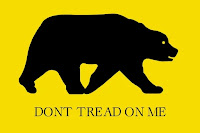I.
Although vaguely sympathetic to the principles of libertarian philosophy, I certainly wouldn't call myself a libertarian and think that even freedom becomes problematic when turned into an ideal: I can see why limits might be placed upon individual liberty and I accept the need for some form of minimal state.
Thus it is that Matthew Hongoltz-Hetling's new book attracted my interest ...
II.
A Libertarian Walks Into a Bear (2020) amusingly exposes the shortcomings of libertarian politics put in to practice; in this case, the attempt to establish a self-governing, small-town utopia in rural New Hampshire, in which everyone marches to the beat of a different drum and no one pays taxes.
Twenty years ago, a group of self-styled free radicals came up with the Free Town Project; a plan to take over a small community of roughly a thousand souls and shape it in their own image. In 2004, they moved to Grafton, NH, a sparsely populated settlement with only one main road running through it and quickly took control - just like the corrupt New York City police officers who dominated Garrison, NJ, in the movie Cop Land (1997).
The first thing they did was cut public funding by 30 percent, negatively impacting the schoolhouse, the library, and the fire department. State and federal laws were still on the books, but no longer enforced. Citizens were free to carry whatever weapons they liked, ignore hunting regulations, and dispose of their own garbage however they saw fit.
Soon, with rubbish piling up and sensing an opportunity, the local bears decided to move into town and an ideologically-driven social experiment conducted by quirky individuals who had met over the internet in dubious chatrooms where they discussed Ayn Rand, came up against grizzly reality.
It seems that autonomous individuals don't always self-regulate and assist one another - they don't even empty their bins! Living free often means living an impoverished existence in which one is always at risk - if not from bears and potholes, then from one's neighbours (New Hampshire has the highest per capita rate of ownership for fully automatic weapons).
As Hongoltz-Hetling notes, despite all their best efforts, the 200-odd libertarians who had promised to create a robust and dynamic private sector, had instead made an already poor town much worse off - and overrun with aggressive and increasingly bold black bears, whilst those now in positions of authority argued whether they should or should not do something about it.
(Surely it was up to each individual to defend themselves and their property? Isn't bear management just another statist attempt at control?)
Ultimately, the New Town project failed because no one - or, at least, no one in their right mind - wants to encounter a huge hungry bear in their backyard.
As Patrick Blanchfield concludes in an excellent review of Hongoltz-Hetling's book, whether libertarians wish to accept it or not, "when it comes to certain kinds of problems, the response must be collective, supported by public effort, and dominated by something other than too-tidy-by-half invocations of market rationality and the maximization of individual personal freedom."
See:
Matthew Hongoltz-Hetling, A Libertarian Walks into a Bear, (PublicAffairs, 2020).
Patrick Blanchfield, 'The Town That Went Feral', The New Republic, (Oct 13, 2020): click here to read online.



